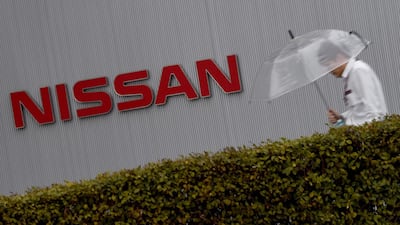Japanese car major Nissan on Thursday said sales in markets including the Middle East, Africa, Asia and Oceania and Latin America, increased by 2 per cent to 607,000 units - beating the increase in Europe, including Russia, where sales rose by just 0.3 per cent to 544,000 units, despite an inspection scandal that hurt its figures.
The bigger increase in MEA, Asia and Ociania for the 12 months to the end of December was due amid rising demand for models such as the Nissan Kicks and Datsun redi-GO, Nissan said.
Vice president Joji Tagawa said it had been a "challenging" period for the car maker but that he saw some light at the end of the tunnel.
"We remain focused on improving the state of our business performance and our financial results despite market headwinds ... we expect to normalise our operations by the end of the fiscal year," he said.
"We take it very seriously so we are putting in place various measures to cope with the situation."
In China sales increased 12.2 per cent to 1.52 million units.
For the nine-month period to December 31, 2017, Nissan’s global unit sales were 4.109 million units, an increase of 2.9 per cent over the same period of fiscal year 2016.
_______________
Read more:
Nissan to spend Dh34bn in push to crack China
Toyota profit surges 54 per cent in third quarter
_______________
In Japan, unit sales increased by 9.7 per cent to 378,000 units as a sharp rise in mini-car demand offset a 3.4 per cent decrease in registered car sales to 252,000 units due to the damaging final vehicle inspection scandal. Because of that, the firm cut its forecast for full-year operating profit after saying the issue had "adversely impacted" the firm's performance.
Nissan said it now expects operating profit of ¥565 billion (Dh19.09bn) for the fiscal year to March 2018, a drop of 12.4 per cent from its previous estimate in November, according to AFP.
"During the period, the group's performance was adversely impacted by special items related to the final vehicle inspection issue in Japan, along with slowing sales growth, negative pricing trends and inventory adjustments in the US market," Nissan said.
Nissan was forced to recall some 1.2 million vehicles after admitting in October that staff without proper authorisation had conducted final inspections on some vehicles intended for the domestic market before they were shipped to dealers.
The car maker suspended all domestic production for a few weeks, sending its passenger car sales plummeting more than 55 per cent in Japan in October.
In a bid to atone for the inspection scandal, chief executive Hiroto Saikawa said he was "voluntarily" returning his pay, along with other executives.
Nissan's operating profit for the nine months to December 2017 was ¥364.2bn, a 27.6 per cent decline from the same period last year.

